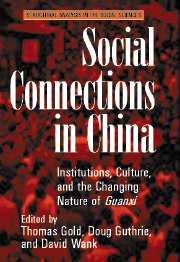Book contents
An Introduction to the Study of Guanxi
Published online by Cambridge University Press: 30 July 2009
Summary
Guanxi (pronounced “gwan-shee”), loosely translated as “connections,” is the latest Chinese word to gain entry into English parlance. While the term was virtually unknown to non-Chinese speakers a decade ago, today it is used by Chinese and non-Chinese speakers alike, and it has made its way into many popular venues. Indeed, Internet search engines such as Yahoo and Altavista yield some 2,000 references under the heading “guanxi.” Conventional wisdom among Chinese and foreigners holds that in the People's Republic of China (PRC), guanxi is absolutely essential to successfully complete any task in virtually all spheres of social life. Guanxi purportedly performs a critical lubricating function in Mainland China, and also in the peripheral Chinese societies of Hong Kong and Taiwan, among minority Chinese communities in Southeast Asia and elsewhere, and as a means of linking together the global Chinese diaspora.
Guanxi has both positive and negative connotations, with the latter dominating most of the discussions. Critics see it as fueling the country's rampant corruption, and as an obstacle to China's becoming a modern society based on the rule of law. Those who see it in a more favorable light contend that guanxi adds an element of humanity to otherwise cold transactions, and comes to the rescue in the absence of consistent regulations or guidelines for social conduct.
- Type
- Chapter
- Information
- Social Connections in ChinaInstitutions, Culture, and the Changing Nature of Guanxi, pp. 3 - 20Publisher: Cambridge University PressPrint publication year: 2002
- 78
- Cited by

